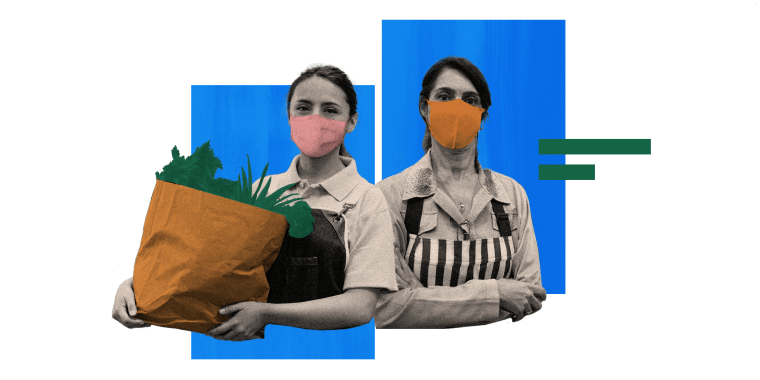There is so much from 2020's terrible plague year that we all hope to leave behind, but for those of us who have survived, not everything needs to be tossed aside. Smaller things, like wintertime mask-wearing, will probably stick around (there's a reason flu season barely registered this year), but the pandemic has also brought bigger ideological shifts in how we see the world — and, more specifically, in how we conceptualize and value work itself.
The workers whose labor was all too often been ignored, dismissed or rendered invisible before Covid-19 arrived were suddenly thrust into the spotlight.
The workers whose labor was all too often been ignored, dismissed or rendered invisible before Covid-19 arrived were suddenly thrust into the spotlight, greeted with rounds of applause and signs of gratitude and granted a brand new designation: essential. Of course, these workers were always essential, and the work they do has long been the only thing that keeps our society functioning at what passes for a normal level. But as those who could do so suddenly retreated to home offices (or vacation homes), it became painfully apparent how much our society depends on the people who wouldn't have been able to just stay safe at home, even if they wanted to.
Health care workers and first responders rightly got their due, but so did other hospital workers: the folks who mopped the floors, did the laundry and handled the bodies while doctors and nurses frantically tried to stem the tide of death. City dwellers rallied around sanitation workers and transit workers and helped amplify their demands for proper protective equipment and wages; restaurant staffers and delivery workers kept people's bellies full and their cupboards stocked and ensured that the more vulnerable members of our communities could stay out of harm's way.
Farmworkers and meatpacking plant employees risked it all to prevent major disruptions in the food supply chain, and grocery store workers stood on the front lines to deliver that food into panicked, waiting hands. Teachers struggled to keep their students and themselves safe, an impossible puzzle that they have thrown their hearts into solving. Warehouse workers — particularly those at e-commerce behemoths like Amazon, Target and Walmart — picked and packed millions of orders of necessities and depression buys alike, and utility workers across the country kept the lights on.
Now, a year into the pandemic, over a half-million people are dead; few of them were government officials or the wealthy elite, but a great and terrible number of them spent their final season on Earth engaged in the very essential work that turned them into heroes — but ended up costing them their lives.
While the applause has died down and the signs have wilted in the early spring rain, we will remember that phrase — "essential worker" — and the knowledge of who exactly kept the world turning while the government twiddled its thumbs and the superrich raked in record profits.
Those who were already suffering felt the knife twist deepest, and even many of those who started out on stable ground had their lives collapse around them. While grocery store workers were dying, tech moguls Jeff Bezos and Elon Musk made billions; when transit workers were saying goodbye to their colleagues, the former president was golfing, his veins pumped full of exclusive treatments.
There is no going back now, and a new wave of labor activism and working class resistance not only is inevitable; it is already happening.
A necessary class consciousness has arisen in this country's essential workforce, and the explosion in new organizing and labor actions is an excellent sign of potential victories. Amazon workers in Bessemer, Alabama, are in the midst of a vote to form the company's first union, which could have major ripple effects on the company's other U.S. facilities. Teachers across the country are striking to protect their students and open schools safety. Unionized grocery store workers have forced major supermarket chains to provide more hazard pay. Coal miners and graduate student workers are threatening to strike over wages and safety — and these are only a few examples.
On a federal level, the new administration has taken a decidedly pro-labor stance, and the Covid-19 relief bill offered financial support to millions of workers (despite its shameful failure to include a $15 minimum wage hike), while with the potential passage of the PRO Act, labor is in a decent position to make real material gains. Things still aren't great, but they're an awful lot better than they were this time last year.
The pinprick of light at the end of this dark tunnel is finally coming into view, and it will hopefully bring a new era of working-class resistance along with it. Their work was always essential, but now, it is impossible to ignore.
Other essays from our project on what we should keep post-pandemic:
- Covid masks save American lives. They still can (and should) post-pandemic, by Dr. Megan Ranney
- Social distancing during Covid means no hugs. My personal space finally feels respected, by Christina Wyman
- Covid's remote parties allowed us to celebrate with all of our dearest, not just our nearest, by Rachel Pomerance Berl
- Even post-Covid, outdoor dining should keep going. Our staid restaurant culture has to evolve, by Deanna Fox
- I moved back home during the Covid pandemic. Here's what I gained by giving up my solo life, by Samhita Mukhopadhyay
- Covid walks kept this angry caffeine addict sane. And I'm going to keep walking, by Meredith Bennett-Smith
- Covid deaths made us aware of our mortality. Here's why that's a good thing, by Maggie Mulqueen


